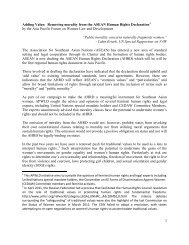A Digest of Case Law on the Human Rights of Women - Asia Pacific ...
A Digest of Case Law on the Human Rights of Women - Asia Pacific ...
A Digest of Case Law on the Human Rights of Women - Asia Pacific ...
You also want an ePaper? Increase the reach of your titles
YUMPU automatically turns print PDFs into web optimized ePapers that Google loves.
Mr Benjamin Peter, Mrs Mina Kumari Tilija Peter v His Majesty’s Government, etc (Nepal)<br />
The petiti<strong>on</strong>ers argued that Rule 14(3) was discriminatory <strong>on</strong> <strong>the</strong> basis <str<strong>on</strong>g>of</str<strong>on</strong>g> sex<br />
and was inc<strong>on</strong>sistent with <strong>the</strong> equality provisi<strong>on</strong> c<strong>on</strong>ferred in Article 11 <str<strong>on</strong>g>of</str<strong>on</strong>g> <strong>the</strong><br />
C<strong>on</strong>stituti<strong>on</strong>. Rule 14(3), according to <strong>the</strong> petiti<strong>on</strong>ers, was also c<strong>on</strong>trary to CEDAW<br />
and <strong>the</strong> Internati<strong>on</strong>al Covenant <str<strong>on</strong>g>of</str<strong>on</strong>g> Civil and Political <strong>Rights</strong> 1966. The petiti<strong>on</strong>ers<br />
argued that <strong>the</strong> Regulati<strong>on</strong> should be declared unlawful as <strong>the</strong> Nepal Treaties Act<br />
1990 provided that internati<strong>on</strong>al law prevailed over nati<strong>on</strong>al laws, which were<br />
inc<strong>on</strong>sistent with <strong>the</strong> relevant treaty.<br />
The defendants argued that <strong>the</strong> petiti<strong>on</strong>er had not filled out <strong>the</strong> form required for<br />
foreigners wanting to enter Nepal. Without completi<strong>on</strong> <str<strong>on</strong>g>of</str<strong>on</strong>g> <strong>the</strong> relevant form, <strong>the</strong><br />
Department could not decide whe<strong>the</strong>r <strong>the</strong> visa should be issued. Since <strong>the</strong> procedure<br />
had not been adhered to it could not be argued that its acti<strong>on</strong> was discriminatory. The<br />
defendants also argued that <strong>the</strong> equality provisi<strong>on</strong> in Article 11 <str<strong>on</strong>g>of</str<strong>on</strong>g> <strong>the</strong> C<strong>on</strong>stituti<strong>on</strong><br />
is a general provisi<strong>on</strong> and could not be used to interpret <strong>the</strong> special provisi<strong>on</strong>s <str<strong>on</strong>g>of</str<strong>on</strong>g> <strong>the</strong><br />
C<strong>on</strong>stituti<strong>on</strong> such as Part 2, which relates to citizenship.<br />
Decisi<strong>on</strong><br />
The Court rejected <strong>the</strong> petiti<strong>on</strong>. It held that <strong>the</strong> petiti<strong>on</strong>ers had not filed <strong>the</strong> proper<br />
applicati<strong>on</strong> form for a visa durati<strong>on</strong> extensi<strong>on</strong> and <strong>the</strong>ir petiti<strong>on</strong> was <strong>the</strong>refore<br />
premature. The Court did not address any <str<strong>on</strong>g>of</str<strong>on</strong>g> <strong>the</strong> substantive issues raised in this<br />
case except to comment that it did agree with <strong>the</strong> defendants in <strong>the</strong>ir asserti<strong>on</strong> that<br />
a general provisi<strong>on</strong> <str<strong>on</strong>g>of</str<strong>on</strong>g> <strong>the</strong> C<strong>on</strong>stituti<strong>on</strong> could not be used to interpret a special<br />
provisi<strong>on</strong>.<br />
Commentary<br />
This case is a setback for Nepalese women’s rights. The Regulati<strong>on</strong> clearly<br />
discriminates against Nepalese women who choose to marry foreigners and <strong>the</strong><br />
Court’s decisi<strong>on</strong> to reject <strong>the</strong> petiti<strong>on</strong> reinforces this discriminati<strong>on</strong>. No substantive<br />
reas<strong>on</strong>s were given by <strong>the</strong> Court to justify <strong>the</strong> presence <str<strong>on</strong>g>of</str<strong>on</strong>g> additi<strong>on</strong>al regulati<strong>on</strong>s<br />
placed <strong>on</strong> Nepalese women who marry foreigners.<br />
Nepal has a progressive C<strong>on</strong>stituti<strong>on</strong> and since <strong>the</strong> Nepal Treaties Act 1990 expressly<br />
provides for internati<strong>on</strong>al standards to be incorporated into domestic law, <strong>the</strong> case<br />
reflects a disregard for women’s rights in Nepal. The Court opted for a c<strong>on</strong>servative<br />
and easier path by not addressing <strong>the</strong> c<strong>on</strong>stituti<strong>on</strong>al issues raised by <strong>the</strong> petiti<strong>on</strong>ers.<br />
However, this case does not represent a negative precedent because <strong>the</strong> Court<br />
avoided <strong>the</strong> substantive issues and made its finding against <strong>the</strong> petiti<strong>on</strong>ers <strong>on</strong> <strong>the</strong><br />
basis <str<strong>on</strong>g>of</str<strong>on</strong>g> <strong>the</strong>ir failure to correctly follow <strong>the</strong> visa applicati<strong>on</strong> procedures. It can<br />
<strong>the</strong>refore be distinguished by advocates in future cases (see also: Meera Gurung v<br />
Her Majesty’s Government, Supreme Court, Decisi<strong>on</strong> No. 4858 <str<strong>on</strong>g>of</str<strong>on</strong>g> 1994 included<br />
under c<strong>on</strong>stituti<strong>on</strong>al law cases).<br />
13



